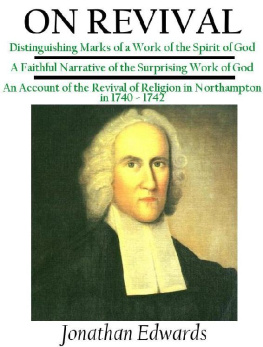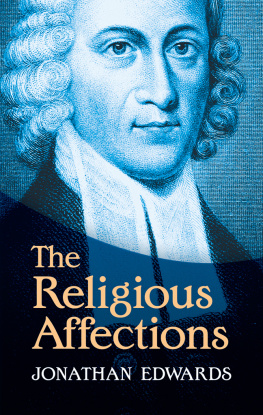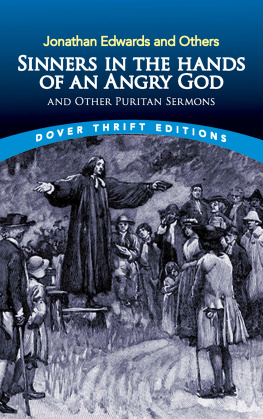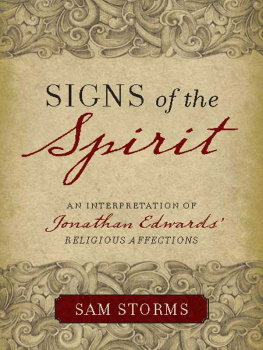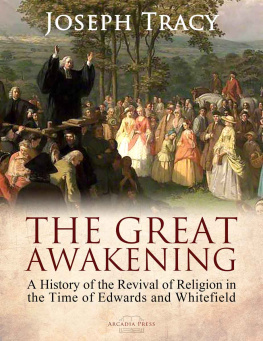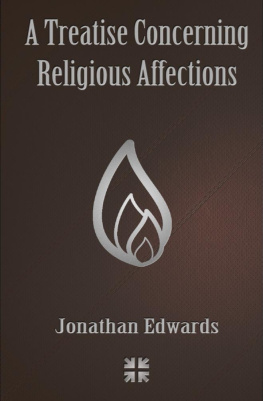Jonathan Edwards - Jonathan Edwards: On Revival
Here you can read online Jonathan Edwards - Jonathan Edwards: On Revival full text of the book (entire story) in english for free. Download pdf and epub, get meaning, cover and reviews about this ebook. year: 1984, publisher: Banner of Truth, genre: Religion. Description of the work, (preface) as well as reviews are available. Best literature library LitArk.com created for fans of good reading and offers a wide selection of genres:
Romance novel
Science fiction
Adventure
Detective
Science
History
Home and family
Prose
Art
Politics
Computer
Non-fiction
Religion
Business
Children
Humor
Choose a favorite category and find really read worthwhile books. Enjoy immersion in the world of imagination, feel the emotions of the characters or learn something new for yourself, make an fascinating discovery.
- Book:Jonathan Edwards: On Revival
- Author:
- Publisher:Banner of Truth
- Genre:
- Year:1984
- Rating:3 / 5
- Favourites:Add to favourites
- Your mark:
- 60
- 1
- 2
- 3
- 4
- 5
Jonathan Edwards: On Revival: summary, description and annotation
We offer to read an annotation, description, summary or preface (depends on what the author of the book "Jonathan Edwards: On Revival" wrote himself). If you haven't found the necessary information about the book — write in the comments, we will try to find it.
Jonathan Edwards: On Revival — read online for free the complete book (whole text) full work
Below is the text of the book, divided by pages. System saving the place of the last page read, allows you to conveniently read the book "Jonathan Edwards: On Revival" online for free, without having to search again every time where you left off. Put a bookmark, and you can go to the page where you finished reading at any time.
Font size:
Interval:
Bookmark:
ON REVIVAL
by
Includes:
Distinguishing Marks of a Work of the Spirit of God
A Faithful Narrative of the Surprising Work of God
An Account of the Revival of Religion in Northampton in 1740 - 1742
of the Spirit of God
In the apostolic age, there was the greatest outpouring of the Spirit of God that ever was; both as to his extraordinary influences and gifts, and his ordinary operations, in convincing, converting, enlightening, and sanctifying the souls of men. But as the influences of the true Spirit abounded, so counterfeits did also abound: the devil was abundant in mimicking, both the ordinary and extraordinary influences of the Spirit of God, as is manifest by innumerable passages of the apostles writings. This made it very necessary that the church of Christ should be furnished with some certain rules, distinguishing and clear marks, by which she might proceed safely in judging of the true from the false without danger of being imposed upon. The giving of such rules is the plain design of this chapter, where we have this matter more expressly and fully treated of than any where else in the Bible. The apostle, of set purpose, undertakes to supply the church of God with such marks of the true Spirit as may be plain and safe, and well accommodated to use and practice; and that the subject might be clearly and sufficiently handled, he insists upon it throughout the chapter, which makes it wonderful that what is here said is no more taken notice of in this extraordinary day, when there is such an uncommon and extensive operation on the minds of people, such a variety of opinions concerning it, and so much talk about the work of the Spirit.
The apostles discourse on this subject is introduced by an occasional mention of the indwelling of the Spirit, as the sure evidence of an interest in Christ. And he that keepeth his commandments dwelleth in him, and he in him; and hereby we know that he abideth in us, by the Spirit which he hath given us. Whence we may infer, that the design of the apostle is not only to give marks whereby to distinguish the true Spirit from the false, in his extraordinary gifts of prophecy and miracles, but also in his ordinary influences on the minds of his people, in order to their union to Christ, and being built up in him; which is also manifest from the marks themselves that are given, which we shall hereafter notice.
The words of the text are an introduction to this discourse of the distinguishing signs of the true and false Spirit.--Before the apostle proceeds to lay down these signs, he exhorteth Christians, first, against an over credulousness, and a forwardness to admit every specious appearance as the work of a true Spirit. Beloved, believe not every spirit, but try the spirits whether they are of God. And, second, he shows, that there were many counterfeits, because many false prophets were gone out into the world. These did not only pretend to have the Spirit of God in his extraordinary gifts of inspiration, but also to be the great friends and favourites of heaven, to be eminently holy persons, and to have much of the ordinary saving, sanctifying influences of the Spirit of God on their hearts. Hence we are to look upon these words as a direction to examine and try their pretences to the Spirit of God, in both these respects.
My design therefore at this time is to show what are the true, certain, and distinguishing evidences of a work of the Spirit of God, by which we may safely proceed in judging of any operation we find in ourselves, or see in others. And here I would observe, that we are to take the Scriptures as our guide in such cases. This is the great and standing rule which God has given to his church, in order to guide them in things relating to the great concerns of their souls; and it is an infallible and sufficient rule. There are undoubtedly sufficient marks given to guide the church of God in this great affair of judging of spirits, without which it would lie open to woeful delusion, and would be remedilessly exposed to be imposed on and devoured by its enemies. And we need not be afraid to trust these rules. Doubtless that Spirit who indited the Scriptures knew how to give us good rules, by which to distinguish his operations from all that is falsely pretended to be from him. And this, as I observed before, the Spirit of God has here done of set purpose, and done it more particularly and fully than any where else: so that in my present discourse I shall go no where else for rules or marks for the trial of spirits, but shall confine myself to those that I find in this chapter.--But before I proceed particularly to speak to these, I would prepare my way by, FIRST, observing negatively , in some instances, what are not signs or evidences of a work of the Spirit of God.
or , What are no signs by which we are to judge of a work--and especially, What are no evidences that a work is not from the Spirit of God.
NOTHING can be certainly concluded from this, That a work is carried on in a way very unusual and extraordinary; provided the variety or difference be such, as may still be comprehended within the limits of scripture rules. What the church has been used to, is not a rule by which we are to judge; because there may be new and extraordinary works of God, and he has heretofore evidently wrought in an extraordinary manner. He has brought to pass new things, strange works; and has wrought in such a manner as to surprise both men and angels. And as God has done thus in times past, so we have no reason to think but that he will do so still. The prophecies of Scripture give us reason to think that God has things to accomplish, which have never yet been seen. No deviation from what has hitherto been usual, let it be never so great, is an argument that a work is not from the Spirit of God, if it be no deviation from his prescribed rule. The Holy Spirit is sovereign in his operation; and we know that he uses a great variety; and we cannot tell how great a variety he may use, within the compass of the rules he himself has fixed. We ought not to limit God where he has not limited himself.
I. Therefore it is not reasonable to determine that a work is not from Gods Holy Spirit because of the extraordinary degree in which the minds of persons are influenced.
If they seem to have an extraordinary conviction of the dreadful nature of sin, and a very uncommon sense of the misery of a Christless condition--or extraordinary views of the certainty and glory of divine things,--and are proportionably moved with very extraordinary affections of fear and sorrow, desire, love, or joy: or if the apparent change be very sudden, and the work be carried on with very unusual swiftness--and the persons affected are very numerous, and many of them are very young, with other unusual circumstances, not infringing upon scripture marks of a work of the Spirit--these things are no argument that the work is not of the Spirit of God.--The extraordinary and unusual degree of influence, and power of operation, if in its nature it be agreeable to the rules and marks given in Scripture, is rather an argument in its favour; for by how much higher the degree which in its nature is agreeable to the rule, so much the more is there of conformity to the rule; and so much the more evident that conformity. When things are in small degrees, though they be really agreeable to the rule, it is not so easily seen whether their nature agrees with the rule.
There is a great aptness in persons to doubt of things that are strange; especially elderly persons, to think that to be right which they have never been used to in their day, and have not heard of in the days of their day, and have not heard of in the days of their fathers. But if it be a good argument that a work is not from the Spirit of God, that it is very unusual, then it was so in the apostles days. The work of the Spirit then, was carried on in a manner that, in very many respects, was altogether new; such as never had been seen or heard since the world stood. The work was then carried on with more visible and remarkable power than ever; nor had there been seen before such mighty and wonderful effects of the Spirit of God in sudden changes, and such great engagedness and zeal in great multitudes--such a sudden alteration in towns, cities, and countries; such a swift progress, and vast extent of the work--and many other extraordinary circumstances might be mentioned. The great unusualness of the work surprised the Jews; they knew not what to make of it, but could not believe it to be the work of God: many looked upon the persons that were the subjects of it as bereft of reason; as you may see in Acts ii. 13. xxvi. 24. and 1 Cor. iv. 10.
Font size:
Interval:
Bookmark:
Similar books «Jonathan Edwards: On Revival»
Look at similar books to Jonathan Edwards: On Revival. We have selected literature similar in name and meaning in the hope of providing readers with more options to find new, interesting, not yet read works.
Discussion, reviews of the book Jonathan Edwards: On Revival and just readers' own opinions. Leave your comments, write what you think about the work, its meaning or the main characters. Specify what exactly you liked and what you didn't like, and why you think so.

